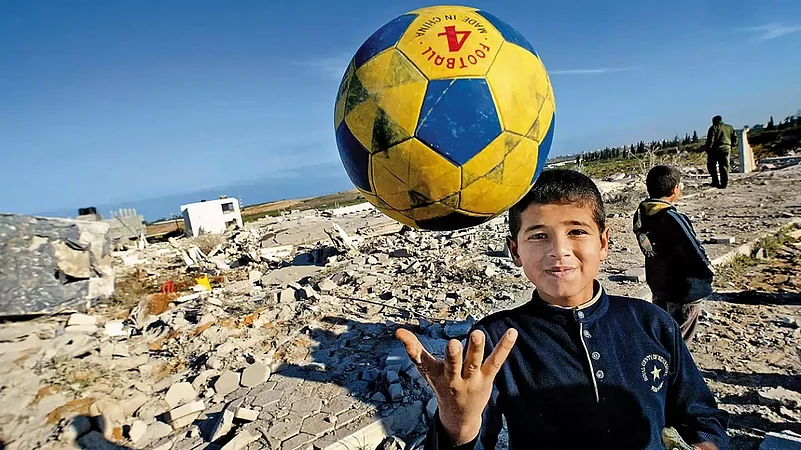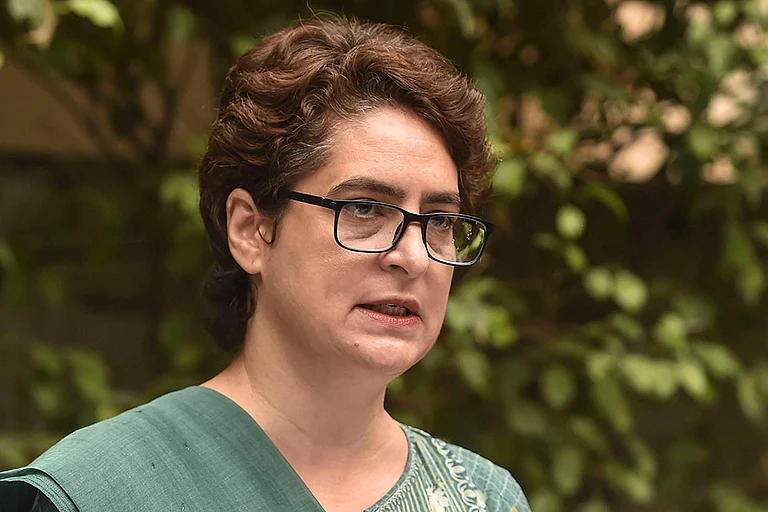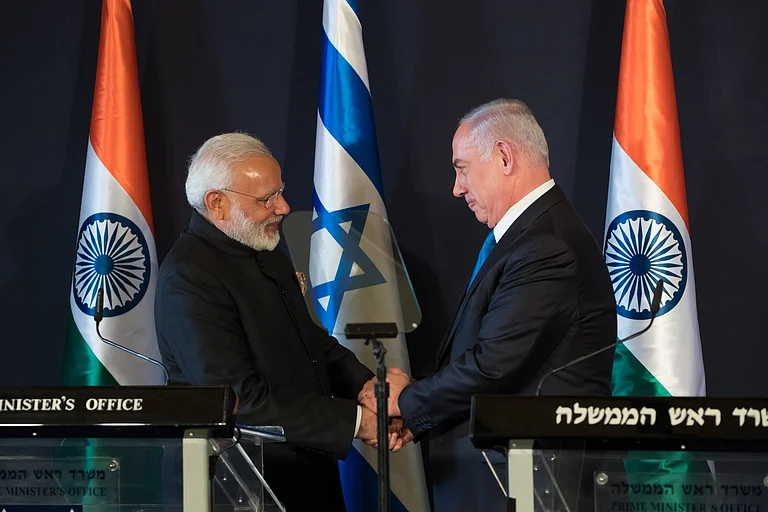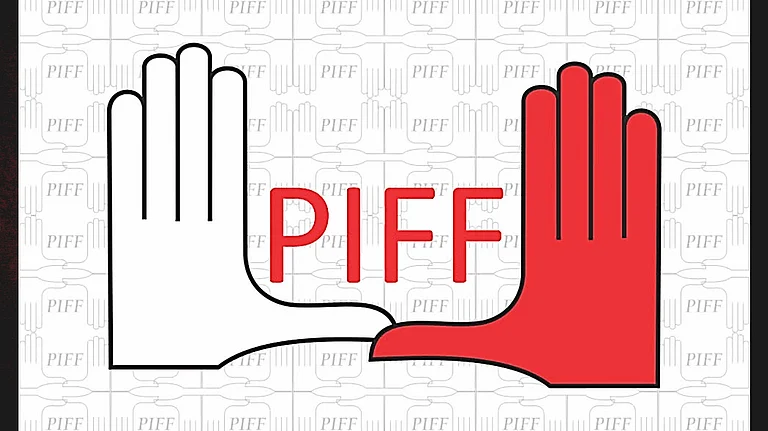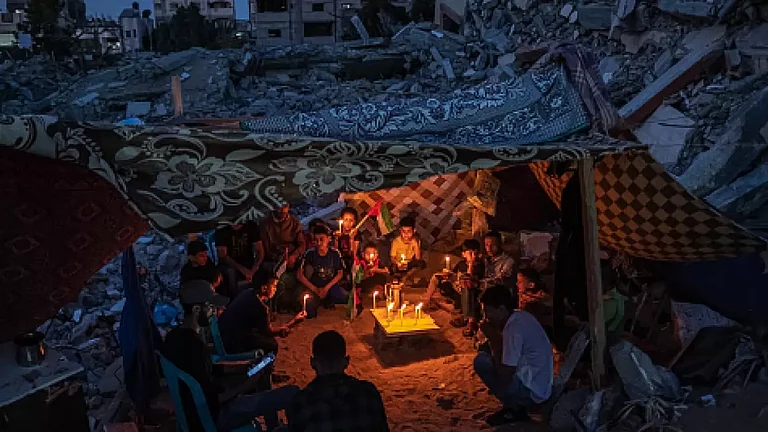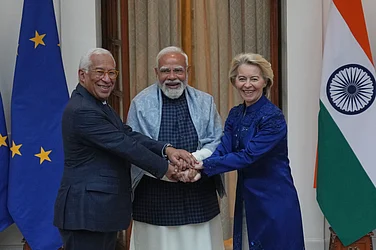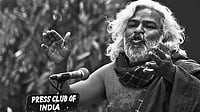It is said that once Lebanese poet and novelist Abbas Beydoun asked Palestinian poet Mahmoud Darwish, "So how did you come to poetry?" and Darwish said, "I don't know...My mother hated marriages and never went to weddings, but she never missed a funeral. I once heard her lamenting at a funeral. I heard her say things that were pure poetry." War brings laments. We must lament the death, destruction and genocide led by the Zionist Israeli state. But let us also sing lullabies for the children of Gaza who are facing the Holocaust. They remain most precarious and insecure. Lullaby is their defence of lives and dreams. Even if they are displaced, even if they have to go into exile, the lullaby will bring them back home. It will keep their memories of childhood alive. Its soundness is the surety of the future of Palestine. We wish that Zionists could also hear the lullaby from the past, from the Holocaust, so they could also see this genocide.
There are many images of Gaza: a city where the sea opens up in a siege and where life meets death but Gaza more fearlessly comes through the faces of children. If Palestine is the body, Gaza is the eyes—the sparkling eyes of the children. If Palestine is a song, Gaza is a lullaby. If Palestine is an anti-colonial struggle, Gaza is its last endurance. Bolted between land and sea, hanging between life and death, in the interval of time and space, Gaza is a lullaby of our time. Palestine has become a metaphor of the lost home of refugees. Gaza is the resilience hope of the resistance, of many lives. It is the gauged eyes of the gauze weavers who used to yarn weft and raft boats on the sea. What you see in the Gaza Strip is not a strip; it is a stripped and slashed body part of the once beautiful Palestine. Lullaby is a reminder of the waft and craft, of the raft and wrought, of the land and the people. It is about closeness, endurance, bonding and connection. It is about the warmth of the body, about wandering together, about the smell of the earth and about holding hands and walking together on a free land to meet Chanda mama.

Lullaby is maternal. It is about the bond between mother, child and grandmother. It is seeped in the connection of births and generations that one feels through sound. It is the natal, it is native; it is about a narrative connection. A lullaby further weaves those connections. Lullaby is the security of the most defenseless subjects, two silent sufferers of the war—women and children. But for the same reasons, the resistance of lullaby is deep, it endures on the landscape; it refuses to die even in death. In poetry, children ask for lullabies even after death. They speak in the voice of poets and ask their mothers as Mahmoud Darwish asks in his poem, “I am old/Give me back the stars of childhood/That I may chart the homeward quest/Back with the migrant birds/Back to your awaiting nest.” Lullaby often comes in the form of the lament of the mothers. But lullaby is also a search for the mother, whose deep sound can be heard but lies buried under the rubble and silence.
With ethnic cleansing on, more than anything else, Gaza is about being human. Gaza meets lullaby on the question of what it is to be human. In the words of Rebekah Pryor, a lullaby is a hopeful reminder of our capacity. It is about our self-affection and preservation, and for meeting and nurturing others in their differences. Anyway, the lullaby and the lament are not that far apart. Both are deeply woven into the body. The question one can ask is whether a lullaby offers resistance, whether play makes any sense in the time of war. The problem with children is that they do not stop playing and asking questions. They want lullaby whenever they feel unsafe. They will ask for it with bandages wrapped over their eyes, and bullet marks on their bodies:
Tomorrow, the bandages
will come off. I wonder
will I see half an orange,
half an apple, half my
mother's face
with my one remaining eye?
I hear a nine-month-old
has also lost an eye,
I wonder if my soldier
shot her too–a soldier
looking for little girls who
look him in the eye—
I'm old enough, almost four,
I've seen enough of life,
but she's just a baby
who didn't know any better.
-‘From the Diary of an Almost-Four-Year-Old’, Hanan Ashrawi
In the situation of war, poverty and genocide, children grow faster. They often grow older than their parents. They share concerns. They become adults. They stand shoulder to shoulder with their fathers. They become mothers to their siblings. They become mountains and sea at an early age. The maturity that a grandfather might have attained at the age of 74, these children get at the age of four. They would say that they have seen enough of their lives. They have experienced enough of this world. They talk like grandmothers. If needed, they will sing loris for you. If Palestine is the youth, Gaza is the child. Not the primitive child of the West, but the children who have grown up like their grandmothers.

Gaza is not only bonded by land and sea but also by the body and memories. Gaza and children cannot be separated. Wounded, with bandages, with one eye, Gaza has to live with the children. It has to survive the Holocaust. Children have to be saved so Gaza can survive. To see Gaza not dying in a broken dream, we need to save these children. Palestine will never die if these children are there. Like the Nazis, the Zionist state knows it better. Their attacks on children are not miscalculations; children are part of their statistics. They are the subject of the genocidal game. Children too are the target. They have been targets of all the genocides in history, from the Holocaust to the poisoning of Native Americans. Gaza is not an exception. If the children will survive,Gaza will at least live in a dream. Gaza will come to play in exile. Gaza will go to meet these children wherever they will go. Mahmoud Darwish would cry out, “Exile is so strong within me, I may bring it to the land.” If Gaza has been turned into a graveyard of children, it has to become a beautiful garden of children. This is the minimal compensation humanity must pay to save its face.
Lullaby Will Bring Them Back
War and genocide change our priorities. Elders forget to sing lullabies to children. They forget to play with the children as they think prayers are more important than play. Moumita Alam embodies the voice of parents, who express an inability to sing a lullaby:
I'm sorry
I don't know
how to sing a lullaby for you.
Let's pray for the fall of physics.
Let's pray that the drones miss the targets
Of the sleeping children.
But children keep playing. They play when rain falls. They play, even when the bombs drop. They play even when the world falls apart. Perhaps they know that if they will keep playing, they can recreate the world. Many died while playing in the streets. They play in dreams and days. Children have purpose in play. Stories and plays cannot be dissociated from childhood.That would be a near-death of childhood. One of the most heinous crimes a criminal or coloniser wants to perpetuate is to traumatise children so they do not come out to play. To ensure children do not fall into unbearable trauma, they need stories, assurances. And they need lullabies to see the moon of the grandmother sitting under the mulberry tree beyond the moon stuffed by the smoke of explosions.
Children want lullaby whenever they feel unsafe. They will ask for it with bandages wrapped over their eyes, and bullet marks on their bodies.
While parents pray, children cannot stop playing. But in their play, they start enacting life. In the streets of Gaza, children are seen playing martyr games. They are 4-6 years old. They are carrying a young girl as one carries a dead body. I am sure no parent would like their children to play this death game. But children are great observers. They see everything, they observe everything, they feel the pain, they feel the cries. But unlike the old, the great potential of children lies in the fact that they can forget this world when they go to play. On returning, they might ask the question again, “Why do they shoot me?” What could be worse than seeing children playing out their own deaths? Just this play should have shocked the conscience of humanity. But who cares? The Zionist state has turned their life into a game–the game of hide and seek, of life and death. We will bomb you, you try to hide, survive, you can survive. We will run over you, you try to save yourself. We will starve you to death, survive if you can survive.But there is still a difference. While the intent of the apartheid state is clear, children play the death and martyr’s game with the hope that they will return.
You Cannot Stop Them from Dreaming
However pessimistic things may go, you cannot stop children from dreaming, from playing, from creating, from lullabies. You cannot stop them from asking innocent questions, "Mother, why are there no bombs tonight? Has the occupation ended or is the empire dead?" They will go looking for the light amidst fire. They will search for butterflies amidst barbed wires. They will go to play with kittens amidst the carnage.
We need to sing them lullabies; we need to allow them to play, to reaffirm their faith in the world. We need to sing them a lullaby at any cost. See, the crying mothers are singing them loris under the roaring sounds of the jets. In a widely circulated YouTube video, a mother is walking with her daughter telling her, “I am fleeing, but I have a feeling that I will come back home.” For those whose parents are dead, poets and writers are singing a lullaby. They are giving them assurance. This is how a community heals, this is how a resistance survives. But who does it better than Dareen Tatour, a woman poet from Palestine? She wrote a poem titled, ‘Resist, My People, Resist Them’. And she was put behind bars under the charges of terrorism. Where houses are razed, documents seized, bodies burnt and bones dredged, she shows us poetry can become a capacious archive. Seeing the children becoming orphaned, Faiz Ahmad Faiz too tried to console the children of Palestine:
Don’t cry child, your mother has only
just cried herself to sleep
don’t cry child
just a while ego your father took leave
of all his sorrows
But if there is Disney Plus that sells dreams, why do we need lullabies, why do we need fairy tales? Why do we need stories? At least, neoliberal market regimes and western countries think this way. They shell rockets but also send cakes for children. Their aid agencies may send gifts to children after bombarding their homes. This may look like an exaggeration but it is the absurd truth. They count how many trucks of aid have been sent but they will not tell you how many shipyards of explosives they sent. How do the two-year-olds or newborns understand this game—whether it was an Israeli bouquet or bomb or the golden flowers of American democracy that led them to a ‘sound’ sleep?
Defense manufactures and arms dealers who profits on death and destruction must be expecting the children of Gaza to register for insurance from them. These companies manufacture lethal weapons but also sell insurance for disability, dismemberment and coverage for the accidental deaths in war. Two of America’s largest defense contractors told investors recently that Israel’s brutal war on Gaza will be good for companies. One executive claimed that a fourfold increase in artillery production will not be enough to meet additional demand. These companies make profits by manufacturing arms, by dropping bombs on children and selling prosthetic limbs. It is known that their shares also go to the western imperial powers. The paradox is that these companies are not exceptions; they are the model of western colonialism and western democracy.
Unlike other colonised lands, Palestine is still difficult for the settlers and colonisers because its landscape singsa lullaby. It has a strong memory. It remembers its history. It has records of people who were forced to move. It remembers who went without saying goodbye. This is the old Galilean lullaby from Palestine. It keeps reminding travellers:
Our loved ones have left home
Gone away without saying goodbye
When I went by their place one morning to salute the Mulberry tree
No one was there to invite me in
Oh cavalier of the caravan, if you come across them
Let them know that I still cry for them
Tell them my loving eyes haven’t yet closed in sleep
The good nights are gone that should have lasted forever
Do tell our loved ones who’ve moved away
That for anyone, hardship never lasts forever
Hardship never lasts forever
Hardship never lasts forever
To discuss the situation of Palestine, not only do we need a lullaby from Palestine but also from the Holocaust. One can read many such narratives, poetry and artworks of the Holocaust today in relation to the genocidal act of the Zionist state. Let me share a poem by Pavel Friedmann because poetry captures pain more effectively than geopolitics.
Same Butterfly of Holocaust
The last, the very last,
So richly, brightly, dazzlingly yellow.
Perhaps if the sun’s tears would sing
against a white stone…
It was the children from the Jewish community at a point of time but it could have been anyone else. Jews, Red Indians, or Palestinians, Blacks, the oppressed. To keep poetry alive, to keep poetry prophetic, we need to denounce the unnecessary comparison drawn between the Holocaust and Zionism. It is not their differences but their seamless sameness, shamelessness that are scary. It is the denial of the Holocaust and genocide inherent in Zionism that is scary. Seen from the soul of poetry, they are the same. If the Holocaust is the image of the horrific violence of human history, Zionism is its true reverberation. Yesterday's butterfly of concentration is today's butterfly of the ghettos. The poem says, “That butterfly was the last one/Butterflies don’t live here/In the ghetto.” Here the butterfly is becoming a refugee in its own garden, in its own land, from its own mulberry trees. The poem reverberated for the Jewish and Roma children, it resonates for the Palestinian children today. It becomes particular in history, it becomes universal in poetry.
In Solidarity with Palestinians
It is not surprising that when a Zionist Israeli state with the support of the West is hell-bent on its genocidal act, the Jewish community across the world which understands this suffering is standing in solidarity with Palestinians, from Israel to the United States. This solidarity matters more than anything else. It is a sign that humanity is still alive. We still care for our shared world. Poetry often becomes universal. It tells you about the tears of the sky and the cry of the earth. The sound that we can all relate to. The sounds that carry the lullaby. We can find the hope of the children of Gaza in the lullaby of Kannada poet, H S Shivaprakash:
Sleep my daughter sleep
Like cloud on the lap of the sky
Sleep my daughter sleep
Like thunder in cloud's heart
Sleep my daughter sleep
Like volcano in the ocean sleep
Sleep my daughter sleep
Like longings in our souls
Sleep my dear children of Gaza to rise like a wave, to rise in rage, to erupt like a volcano for the longing of Palestine that has been stolen by the Zionist state. If I were to sing a lullaby for Palestinian children, I would ask them not to sleep, but to keep awake, to keep vigil like cats. The colonisers may still steal the land.The lullaby would go like this: Naa so bacche aaj ki raat. (Tonight, do not sleep my child).
Tonight, do not sleep my child
Tonight, do not cry
They are shooting down the stars in the sky
The moon is caught in the barbed wire
The earth is colonised, the land is occupied
And the sea is facing a turbulent wave
Tonight…
This world does not have hands to hold you
We do not have a ground to lay you
Your mom is tired, her body is breaking apart
After moving from one camp to other
Tonight…..
You wait till the dawn
When the occupation will end
When we will return home
When we will get our stolen land back
When stars will come back and the moon will get free
Then you sleep my child under the mulberry tree
Tonight, do not sleep….
(This article appeared in the print as 'Lullaaby of Resistance' )
Brahma Prakash is Assistant Professor at the School of Arts and Aesthetics, JNU and the author of Body On The Barricades






